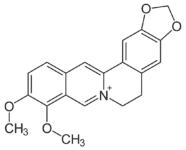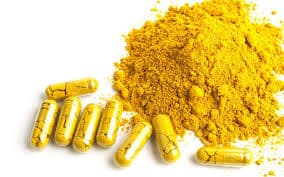Berberine Molecular Structure
Berberine is a type of Isoquinoline Alkaloid found in such plants as Barberry, Golden Seal and Oregon Grape; Golden Seal having the highest concentration. Berberine is one of the most studied among the naturally occurring protoberberine alkaloids. Berberine benefits health with Anti-Inflammatory, Anti-Microbial, Neuro-protective and potential Anti-Cancer properties. Berberine also has potential in Cardiovascular and Digestive health, Metabolism and general Immune support. Herbs containing Berberine have been used to support health since 3,000 BC. Today, technology has enabled the extraction and concentration of this valuable alkaloid making its quality and strength more consistent, providing better therapeutic results.
In addition to Berberine’s virtues, it is now being investigated for its role in the treatment of Anxiety, Depression and Mood Disorders. Berberine significantly alters the levels of Serotonin, Dopamine and Norepinephrine in the brain as described in this 2018 study: “Either acute or chronic administration of berberine at low doses results in increased levels of NE, 5‐HT, and DA in whole‐brain samples. Kulkarni et al showed that acute administration of berberine (5 mg/kg, i.p.) in mice caused increased levels of norepinephrine (31%), serotonin (47%), and dopamine (31%). Chronic administration of berberine (5 mg/kg, ip) for 15 days significantly increased the levels of norepinephrine (29%), serotonin (19%) as well as dopamine (52%).”
Recently, interest in Berberine as an anti-Cancer agent has surged. In a 2021 review of Berberine was the following statement: “Berberine (BBR), a potential bioactive agent, has remarkable health benefits. A substantial amount of research has been conducted to date to establish the anticancer potential of BBR. The present review consolidates salient information concerning the promising anticancer activity of this compound. The therapeutic efficacy of BBR has been reported in several studies regarding colon, breast, pancreatic, liver, oral, bone, cutaneous, prostate, intestine, and thyroid cancers. BBR prevents cancer cell proliferation by inducing apoptosis and controlling the cell cycle as well as autophagy. BBR also hinders tumor cell invasion and metastasis by down-regulating metastasis-related proteins. Moreover, BBR is also beneficial in the early stages of cancer development by lowering epithelial-mesenchymal transition protein expression.” The review also states that to date, there are no chemotherapy drugs on the market based on Berberine. Unfortunately, most doctors will not recommend anything that hasn’t been produced by a pharmaceutical company. Fortunately, you do not have to wait as you can start Berberine supplementation on your own.
The Health Benefits of Berberine:
CARDIOVASCULAR SYSTEM
• May help to prevent Atherosclerosis.
• Can improve the condition of Congestive Heart Failure patients.
• Hypertension may be improved by supplementation.
• May protect the Brain from the toxic after-effects of Ischemic Stroke.
• Can alleviate Ventricular Tachycardia.
DIGESTIVE SYSTEM
• Crohn’s Disease patients may minimize Colon damage with supplementation, due to its ability to inhibit Interleukin 8 (IL-8).
• Diarrhea caused by detrimental Bacteria can be alleviated with supplementation.
• May help in the treatment of Gastroenteritis.
• Helps improve the overall tone of the Digestive Tract.
• Reverses physical damage to the Gastric Mucosa and Intestinal Microvilli brought about by Stress.
EXCRETORY SYSTEM
• Inhibits the ability of Bacteria to adhere to the wall of the Bladder and thus may be useful in the prevention and treatment of Urinary Tract Infections (UTIs).
EYES / VISION
• Eye drops containing Berberine are useful in the treatment of Conjunctivitis.
IMMUNE SYSTEM
• By inhibiting Activator Protein 1, may inhibit the growth of the following Cancers:
▪ Bone
▪ Breast
▪ Cervical
▪ Colon
▪ Esophageal
▪ Liver
▪ Oral/Mouth/Tongue
▪ Neuroblastoma
▪ Pancreatic
▪ Prostate
▪ Skin
▪ Thyroid
• Inhibits/destroys the following Detrimental Bacteria:
▪ Chlamydia pneumoniae
▪ Chlamydia trachomatis
▪ Corynebacterium diphtheriae
▪ Enterococcus species
▪ Escherichia coli
▪ Helicobacter pylori
▪ Mycobacterium tuberculosis
▪ Neisseria gonorrhoeae
▪ Neisseria meningitidis
▪ Porphyromonas gingivalis
▪ Pseudomonas species
▪ Salmonella typhi
▪ Shigella dysenteriae
▪ Staphylococcus species
▪ Methicillin Resistant Staphylococcus aureus (MRSA)
▪ Streptomyces species
▪ Treponema pallidum
▪ Vibrio cholerae
• Helps to inhibit/destroy some types of Detrimental Fungi including:
▪ Candida albicans
▪ Candida krusei
• Helps to inhibit/destroy some type of Detrimental Protozoa including:
▪ Entamoeba histolytica
▪ Giardia lamblia
▪ Trichomonas vaginalis
• Can stimulate the Immune System.
• Helps reduce Inflammation.
• Helps to stimulate Macrophages.
• Can improve Spleen function.
• Inhibits the production of Prostaglandin E2 (PGE2).
• Suppresses some cases of Bronchitis.
METABOLISM
• Helps alleviate Inflammation by reducing levels of pro-inflammatory Cytokines.
• Lowers elevated Blood Sugar levels.
• Reduces Insulin Resistance.
• Cholecystitis (inflammation of the Gall Bladder) can be alleviated by supplementation.
• Stimulates the production of Bile by the Gall Bladder.
• Lowers total serum Cholesterol, Low Density Lipoprotein and Triglyceride levels.
• May help to prevent Cirrhosis.
• Adiponectin production is increased by supplementation making it useful in the treatment of Obesity.
• May prevent Osteoporosis.
• Useful in the treatment of Diabetes Mellitus Type 2 patients.
NERVOUS SYSTEM
• May be useful in the treatment of Anxiety.
• Helps alleviate Depression.
• Useful in the treatment of Mood Disorders.
• Potentiates the release of Nerve Growth Factor (NGF).
• Elevates Brain-Derived Neurotrophic Factor (BDNF).
ORAL HEALTH
• Mouthwash containing Berberine helps prevent/treat Gingivitis.
SKIN
• May be useful in the treatment of Psoriasis due to its ability to suppress the excessive differentiation of Keratinocytes which is associated with Psoriasis.
Berberine (Barberry)
USAGE
Berberine is best taken on an empty stomach 30-60 minutes prior to a meal. Stomach upset can sometimes occur with Berberine. If this is the case for you, try taking it 15 minutes before or immediately prior to a meal. The therapeutic dose of Berberine for various conditions is 400 – 1200mg per day in divided doses.
CAUTION:
If you are using Berberine to lower Blood Sugar it is advisable to proceed slowly as reductions in Blood Sugar can be quite dramatic in some people. Start with one capsule daily and only increase dosage every one to two weeks. Make sure to monitor your Blood Sugar often while you are titrating your dose. In my experience those with normal Blood Sugar using Berberine for Immune System support rarely have issues with low Blood Sugar.
Berberine Supplement
My Personal Recommendations:
Receive my personal support with each verifiable purchase made through this site.
Get answers to your questions either by
email or telephone.
Take advantage of my 35 plus years of experience as a researcher and healer.
Just use the CONTACT form to initiate the process.



